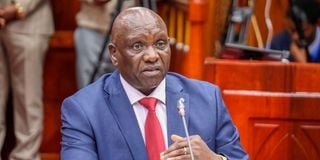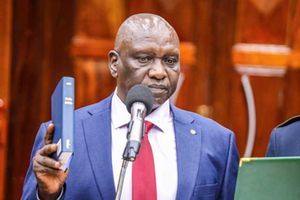Breaking News: Former Lugari MP Cyrus Jirongo dies in a road crash

Nominee Inspector-General of the National Police Service Douglas Kanja Kirocho.
Inspector General nominee Douglas Kanja is set to know his fate as MPs are on Tuesday, September 17, set to resume their sittings to consider a report of the Joint Parliamentary Committee of his vetting.
The Senate has already approved the nomination of Mr Kanja but since the vetting was done jointly, their counterparts in the National Assembly must also make its decision on it.
The lawmakers will also consider a report of the Joint Parliamentary Committee on the vetting of the nominee for the position of Director General of the Competition Authority David Kibet Kemei.
On budget-related legislations, the MPs will also consider two crucial Bills related to the division of funds between the National government and counties.
On this front, the lawmakers will consider The Division of Revenue (Amendment) Bill (2024) which seeks to adjust the distribution of nationally-raised revenue between the national government and county governments.
The consideration of this Bill has been prompted by the rejection of the Financial Bill, 2024 due to the sustained anti-government protests by the young people.
The proposed legislation therefore seeks to implement the distribution of funds noting the significant shortfall in projected revenue for the financial year 2024/2025.
The National Assembly had considered the Bill and referred it to the Senate for consideration last month. It is therefore expected that once concluded by the Senate, the Bill will be referred back to the Assembly during this part of the Session.
Counties have already rejected any proposal to reduce their shareable revenue due to the rejection of the Finance Bill.
Due to the rejection of the Finance Bill, President William Ruto had urged the senate to amend the County Allocation of Revenue Bill, (CARA) 2024 shareable revenue due to counties in the financial year 2024/2025 from Sh400.1 billion to Sh380 billion.
The proposed new figures proposed by the President in what he terms austerity measures to manage the current crisis in the country is Sh5 billion less than the Sh385 billion that the county governments received in the last financial year, 2023/24.
The House is also set to consider four crucial Bills which include the Conflict of Interest Bill, 2023, Sugar Bill, 2022, The Water (Amendment) Bill, 2023 and the National Rating Bill (National Assembly Bill, 2022.
The Conflict of Interest Bill seeks to provide for the management of conflict of interest in the discharge of official duties.
The proposed legislation further seeks to provide clear definitions of conflicts of interest, explicitly identifying where private interests could influence or hinder the impartial exercise of public duty.
The Sugar Bill on the other hand seeks to reinstate the Sugar Act which was repealed through the enactment of the Crops Act, 2013.
The Bill also seeks to restore the roles of the Kenya Sugar Board currently undertaken by the Sugar Directorate of the Agriculture and Food Authority established under the Agriculture and Food Authority Act, 2013.
The Water Amendment Bill seeks to amend the Water Act, of 2016 to provide for public-private partnerships in the water sector.
The National Assembly will also consider two Bills that have emanated from the Senate - the Employment (Amendment) Bill 2022 and Natural Resource Benefit Sharing Bill.
The Employment Bill sponsored by Nandi senator Samson Cherarkey, seeks to limit employers from contacting their employees past working hours.
The natural resource benefit sharing Bill sponsored by Tana River Danson Mungatana, seeks to establish a system of benefit sharing in natural resource exploitation between resource exploiters, the national government, county governments, and local communities.
The lawmakers will sit for 10 weeks before commencing their long recess on December 5.











